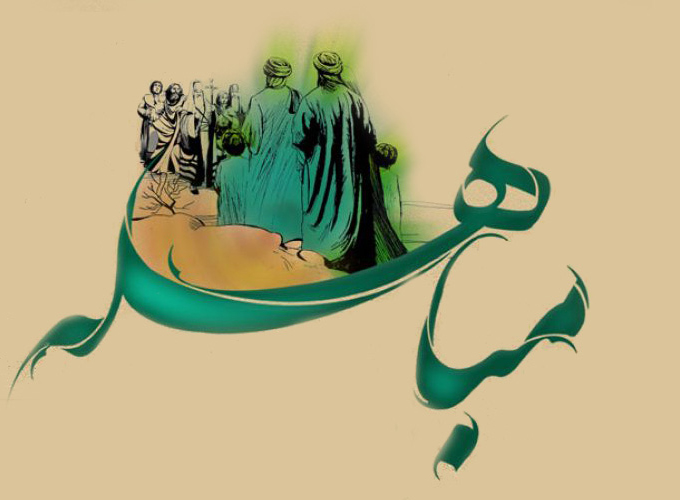The first good tiding: when Yaacoub (a.s) gathered his children to tell them about their destiny in the last days of their lives, he told them:” The sceptre shall not depart from Judah, nor a lawgiver from between his feet, until Shiloh come; and unto him shall the gathering of the people”. [1]
He showed them that when Shiloh comes, the authority and law of Judah end. He will control everything where people and nations will obey him and his laws, and this is clear.
After knowing that the authority of Judas people (bani Israel) is temporary and ends when Shiloh comes, the important point is to know who Shiloh is and what are his characteristics.
The quarrel happened between them about which person or specific people will get the prophecy. The Jesuit fathers commented:” The text and its content made a sharp debate. It is about the coming of a man shrouded in secrets (and obeyed by people). The prophecy awaits a perfect Christian king.”[2]
Therefore, some of them translated the word Shilon in the text with (until its owner comes), and instead of a phrase and he has the submission of peoples, it was mentioned in the Septuagint, Syriac and Phlagata translations, “And Him awaits the nations.”[3]
But the literal meaning of “until Shiloh comes” is “until he who has the authority comes”. [4]
What is meant by prophecy, then, is the Messiah (Jesus Christ) of the end of time. The Jews believe that he has not yet come, and as for the Christians, they tried to apply it to Jesus (pbuh), thinking that he is the last messenger of humanity. They assumed that Shilon was a title for him (pbuh) despite their recognition that it was not used as a title for him in other resources and that it has no clear meaning as a word.[5]
If we take into consideration that Jesus (pbuh) wasn’t sent for all nations but specifically for bani Israel as he mentioned and as it was proved in the Gospels books with hadiths proofing this, then he is not meant by this word because he who has the authority all nations await for him.
Since the honorable prophet Mohammad (pbuh) is the only messenger sent for all nations, it is clear then that he is meant by this prophecy.
This will be more clear when showing the second good tiding of the old testament.
It may be said: This statement does not indicate that whoever has the authority is not from the tribe of Judah, as it is probable that Shilon may not be from his descendants, it is also possible that he is one of them, for the will of the Lord Jesus (pbuh) is not far away, and it is determined when the evidence is established on it.
However, this statement is not correct because in addition to what was mentioned above, regarding the specificity of his call to the bani Israel, and the generality of the aforementioned call of Shilon, it contradicts the explicit words of Jesus when he denied that the Messiah of the end of time was a descendant of Judah. A dialogue took place between him and the Pharisees, on which the evangelists unanimously agreed, saying: “While the Pharisees were gathered together, Jesus asked them, saying, ''What do you think of Jesus, whose son is he? “They said to him, “The son of David.” He said, “How can David in spirit call him Lord?” He said, “The Lord said to my Lord, sit at my right hand until I make your enemies your footstool. Then if David calls him Lord, how is he his son?” No one could answer him with a word. From that day on, no one dared to ask him at all.” [6]
This last sentence has an important significance, as they did not dare to ask him, for they were afraid to clarify the matter that they knew, and they did not want to reveal it in public, which is being related to the Messiah of the promised end time.
Also, their refusal to ask him later is not valid, unless he carries this meaning, as his established biography in the four Gospels indicates that they did not stop asking and defying him, and their boldness against him, and his humility before them.
The second good tiding: God almighty addresses Mosa (pbuh) saying:” “I will send them a prophet from among their brothers like you, and I will put my words in his mouth, and he will speak to them all that I command him, and it will be that the person who does not listen to my words that he speaks, I will demand of him.”[7]
Christians tried to assure this prophecy on Jesus (pbuh) also, but it was a foolish attempt because many characteristics were mentioned about this prophet and none of them is applicable to Jesus (pbuh). The characteristics are:
He is among the brothers of bani Israel not among them, and they see that Jesus is a descendant of Judah.
He is like Moses (pbuh), in the sense that he is the owner of a law, and the Holy Book declares that there is no prophet in bani Israel like Mose, and that he is the best of them at all, especially in the Samaritan version of the Torah.[8]
As for Jesus, he was not the owner of a law according to their claim, and that he used to worship according to the Mosaic Sharia, and he commanded his companions to do so.
That God Almighty puts his words in the mouth of this prophet, and this means that his miracle that indicates his prophecy is a form of laws and legislative provisions that can be steadfast with time, and is not just a matter of disposition in the world of formation that can only be viewed by those who have seen it, as is the case in the miracles of Jesus (pbuh).
Bani Israel is commanded to abide by these new commands, which he expressed as the words of God, and by reviewing the four Gospels, it becomes clear that they are free of everything related to these words.
These are all characteristucs that only apply to the Prophet of Islam (pbuh), for he is definitely meant by them.
His Eminence Al Sheikh Hatem Ismail
[1] Genesis: 10/49
[2] Old Testament page 145, comment no 6
[3] Al Sunan Al Qawim in translating the books of the Old Testament part 1 page 276
[4] The practical explanation of the Holy Book page 121
[5] The updated explanation of the Holy Book, Genesis, page 251
[6] Gospel of Matthew: 22/ 41-42
[7] Book of Deuteronomy: 18/ 18-19
[8] Book of Deuteronomy: 34/ 10-12



















